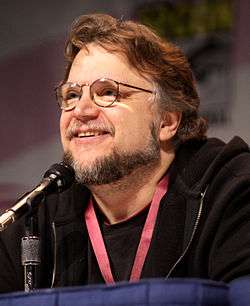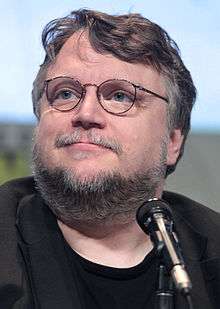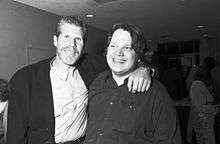Guillermo del Toro
| Guillermo del Toro | |
|---|---|
 Del Toro at the Sitges Film Festival in 2017 | |
| Born |
Guillermo del Toro Gómez[1] October 9, 1964 Guadalajara, Jalisco, Mexico |
| Residence | Los Angeles, California, U.S. |
| Occupation | Film director, screenwriter, producer, novelist |
| Years active | 1985–present |
| Spouse(s) |
Lorenza Newton [2][3](m. 1986; div. 2017) |
| Children | 2 |
| Signature | |
|
| |
Guillermo del Toro Gómez (Spanish: [ɡiˈʝeɾmo ðel ˈtoɾo]; born October 9, 1964) is a Mexican filmmaker, director, screenwriter, producer, author, actor and former special effects makeup artist. He is best known for the Academy Award-winning fantasy films Pan's Labyrinth (2006) and The Shape of Water (2017), winning the Academy Award for Best Director and the Academy Award for Best Picture for the latter.
Throughout his career, del Toro has shifted between Spanish-language horror-fantasy films, such as Cronos (1993) and The Devil's Backbone (2001), and more mainstream American sci-fi-action films, including Mimic (1997), Blade II (2002), Hellboy (2004), Hellboy II: The Golden Army (2008), and Pacific Rim (2013). He also directed the gothic romance film Crimson Peak (2015). As a producer, he worked on the films The Orphanage (2007), Don't Be Afraid of the Dark (2010), The Hobbit film series (2012–14), Mama (2013), The Book of Life (2014), and Pacific Rim Uprising (2018).
With Chuck Hogan, he co-authored The Strain trilogy of novels (2009–2011), later adapted into a comic-book series (2011–15) and a live-action television series (2014–17). With DreamWorks Animation, he created the Netflix animated series Trollhunters (2016–18), the first installment of the Tales of Arcadia trilogy, based on the 2015 novel he co-wrote with Daniel Kraus.
Del Toro's work has been characterized by a strong connection to fairy tales and horror, with an effort to infuse visual or poetic beauty in the grotesque.[4] He has had a lifelong fascination with monsters, which he considers symbols of great power.[5]
Del Toro is also known for his use of insectile and religious imagery, the themes of Catholicism and celebrating imperfection, underworld and clockwork motifs, practical special effects, dominant amber lighting and his frequent collaborations with actors Ron Perlman and Doug Jones.[6][7] He is good friends with fellow Mexican filmmakers Alfonso Cuarón and Alejandro G. Iñárritu, collectively known as "The Three Amigos of Cinema".[8]
Early life
.jpg)
Del Toro was born in Guadalajara, Jalisco, Mexico, the son of Guadalupe Gómez and Federico del Toro Torres, an automotive entrepreneur.[9] He was raised in a strict Catholic household.[10] Del Toro studied at the Centro de Investigación y Estudios Cinematográficos, at the University of Guadalajara.[11]
When del Toro was about eight years old, he began experimenting with his father's Super 8 camera, making short films with Planet of the Apes toys and other objects. One short focused on a "serial killer potato" with ambitions of world domination; it murdered del Toro's mother and brothers before stepping outside and being crushed by a car.[12] Del Toro made about 10 short films before his first feature, including one titled Matilde, but only the last two, Doña Lupe and Geometria, have been made available.[13] He wrote four episodes and directed five episodes of the cult series La Hora Marcada, along with other Mexican filmmakers such as Emmanuel Lubezki and Alfonso Cuarón.[14]
Del Toro studied special effects and make-up with special-effects artist Dick Smith.[15] He spent 10 years as a special-effects make-up designer and formed his own company, Necropia. He also co-founded the Guadalajara International Film Festival. Later in his directing career, he formed his own production company, the Tequila Gang.[16]
In 1997, at the age of 33, Guillermo was given a $30 million budget from Miramax Films to shoot another film, Mimic. He was ultimately unhappy with the way Miramax had treated him during production, which led to his friend James Cameron almost coming to blows with Miramax co-founder and owner Harvey Weinstein during the 70th Academy Awards.[17]
Career
Del Toro has directed a wide variety of films, from comic book adaptations (Blade II, Hellboy) to historical fantasy and horror films, two of which are set in Spain in the context of the Spanish Civil War under the authoritarian rule of Francisco Franco. These two films, The Devil's Backbone and Pan's Labyrinth, are among his most critically acclaimed works. They share similar settings, protagonists and themes with the 1973 Spanish film The Spirit of the Beehive, widely considered to be the finest Spanish film of the 1970s.[18]
People say, you know, "I like your Spanish movies more than I like your English-language movies because they are not as personal", and I go "Fuck, you're wrong!" Hellboy is as personal to me as Pan's Labyrinth. They're tonally different, and yes, of course you can like one more than the other – the other one may seem banal or whatever it is that you don't like. But it really is part of the same movie. You make one movie.
Hitchcock did one movie, all his life.—Guillermo del Toro, Twitch Film, January 15, 2013[4]
Del Toro views the horror genre as inherently political, explaining, "Much like fairy tales, there are two facets of horror. One is pro-institution, which is the most reprehensible type of fairy tale: Don't wander into the woods, and always obey your parents. The other type of fairy tale is completely anarchic and antiestablishment."[19]
He is close friends with two other prominent and critically praised Mexican filmmakers Alfonso Cuarón and Alejandro González Iñárritu.[20] The three often influence each other's directorial decisions, and have been interviewed together by Charlie Rose. Cuarón was one of the producers of Pan's Labyrinth, while Iñárritu assisted in editing the film. The three filmmakers, referred to as the "Three Amigos" founded the production company Cha Cha Cha Films, whose first release was 2008's Rudo y Cursi.[21][22]
Del Toro has also contributed to the web series Trailers from Hell.[23]

In April 2008, del Toro was hired by Peter Jackson to direct the live-action film adaptation of J. R. R. Tolkien's The Hobbit. On May 30, 2010, del Toro left the project due to extended delays brought on by MGM's financial troubles. Although he did not direct the films, he is credited as co-writer in An Unexpected Journey, The Desolation of Smaug and The Battle of the Five Armies.[24]
On December 1, 2008, del Toro expressed interest in a stop-motion remake to Roald Dahl's novel The Witches, collaborating with Alfonso Cuarón.[25] On June 19, 2018 it was announced that Del Toro and Cuarón would instead be attached as Executive Producers on the remake with Robert Zemeckis helming the project as Director and Screenwriter.[26]
On June 2, 2009, del Toro's first novel, The Strain, was released. It is the first part of an apocalyptic vampire trilogy co-authored by del Toro and Chuck Hogan. The second volume, The Fall, was released on September 21, 2010. The final installment, The Night Eternal, followed in October 2011. Del Toro cites writings of Antoine Augustin Calmet, Montague Summers and Bernhardt J. Hurwood among his favourites in the non-literary form about vampires.[27]
On December 9, 2010, del Toro launched Mirada Studios with his long-time cinematographer Guillermo Navarro, director Mathew Cullen and executive producer Javier Jimenez. Mirada was formed in Los Angeles, California to be a collaborative space where they and other filmmakers can work with Mirada's artists to create and produce projects that span digital production and content for film, television, advertising, interactive and other media. Mirada launched as a sister company to production company Motion Theory.[28]
Del Toro directed Pacific Rim, a science fiction film based on a screenplay by del Toro and Travis Beacham. In the film, giant monsters rise from the Pacific Ocean and attack major cities, leading humans to retaliate with gigantic mecha suits called Jaegers. Del Toro commented, "This is my most un-modest film, this has everything. The scale is enormous and I'm just a big kid having fun."[29] The film was released on July 12, 2013 and grossed $411 million at the box office.
Del Toro directed "Night Zero", the pilot episode of The Strain, a vampire horror television series based on the novel trilogy of the same name by del Toro and Chuck Hogan. FX has commissioned the pilot episode, which del Toro scripted with Hogan and was filmed in Toronto in September 2013.[30][31] FX ordered a thirteen-episode first season for the series on November 19, 2013, and series premiered on July 13, 2014.[32]
After The Strain's pilot episode, del Toro directed Crimson Peak, a gothic horror film he co-wrote with Matthew Robbins and Lucinda Cox. Del Toro has described the film as "a very set-oriented, classical but at the same time modern take on the ghost story", citing The Omen, The Exorcist and The Shining as influences. Del Toro also stated, "I think people are getting used to horror subjects done as found footage or B-value budgets. I wanted this to feel like a throwback." Jessica Chastain, Tom Hiddleston, Mia Wasikowska, and Charlie Hunnam starred in the film.[33][34] Production began February 2014 in Toronto, with an April 2015 release date initially planned. The studio later pushed the date back to October 2015, to coincide with the Halloween season.[35]

He was selected to be on the jury for the main competition section of the 2015 Cannes Film Festival.[36][37]
Del Toro directed the Cold War drama film The Shape of Water, starring Sally Hawkins, Octavia Spencer, and Michael Shannon.[38]
Filming began on August 15, 2016 in Toronto,[39][40][41] and wrapped twelve weeks later.[42]
On August 31, 2017, the movie premiered in the main competition section of the 74th Venice International Film Festival, where it was awarded the Golden Lion for best film, making Del Toro the first Mexican director to win the award.[43][44] For his work, del Toro won the Academy Award for Best Director and the Academy Award for Best Picture.
At the D23 Expo in 2009, his Double Dare You production company and Disney announced a production deal for a line of darker animated films. The label was announced with one original animated project, Trollhunters.[45][46] However, del Toro moved his deal to DreamWorks in late 2010.[47] Trollhunters was released to great acclaim on Netflix and "is tracking to be its most-watched kids original ever".[48]
In 2017, Del Toro had an exhibition of work at the Minneapolis Institute of Art titled Guillermo del Toro: At Home with Monsters, featuring his collection of paintings, drawings, maquettes, artifacts, and concept film art.[49] The exhibition ran from March 5, 2017, to May 28, 2017.
Personal life
He was married to Lorenza Newton, cousin of Mexican singer Guadalupe Pineda. They have two children. He started dating Lorenza when both were studying at the Instituto de Ciencias in Guadalajara. Del Toro and Newton separated in early 2017, and divorced in September of the same year. He maintains residences in Toronto and Los Angeles, and returns to Guadalajara every six weeks to visit his family.[50][51]

He also owns two separate houses exclusively to house his books, poster artwork and other belongings pertaining to his work, explaining, "As a kid, I dreamed of having a house with secret passages and a room where it rained 24 hours a day. The point of being over 40 is to fulfill the desires you've been harboring since you were 7."[19]
Politics
In a 2007 interview, del Toro described his political position as "a little too liberal". He pointed out that the villains in most of his films, such as the industrialist in Cronos, the Nazis in Hellboy, and the Francoists in Pan's Labyrinth, are united by the common attribute of authoritarianism. "I hate structure. I'm completely anti-structural in terms of believing in institutions. I hate them. I hate any institutionalised social, religious, or economic holding."[52]
Religion
Del Toro was raised Roman Catholic. In a 2009 interview with Charlie Rose, he described his upbringing as excessively "morbid," saying, "I mercifully lapsed as a Catholic ... but as Buñuel used to say, 'I'm an atheist, thank God.'" Though insisting that he is spiritually "not with Buñuel" and that "once a Catholic, always a Catholic, in a way." He concluded, "I believe in Man. I believe in mankind, as the worst and the best that has happened to this world."[53] He has also responded to the observation that he views his art as his religion by saying, "It is. To me, art and storytelling serve primal, spiritual functions in my daily life. Whether I'm telling a bedtime story to my kids or trying to mount a movie or write a short story or a novel, I take it very seriously."[19] Nevertheless, he became a "raging atheist" after seeing a pile of human fetuses while volunteering at a Mexican hospital.[54] He has claimed to be horrified by the way the Catholic Church complied with Francoist Spain, down to having a character in his film quote what actual priests would say to Republican faction members in concentration camps.[55] Upon discovering the religious beliefs of C.S. Lewis, Del Toro has stated that he no longer feels comfortable enjoying his work, despite doing so beforehand.[56] He describes Lewis as "too Catholic" for him, despite the fact that Lewis was never a Catholic.[57]
However, Del Toro isn't entirely disparaging of Catholicism, and his background continues to influence his work. While discussing The Shape of Water, Del Toro discussed the Catholic influence on the film, stating, "A very Catholic notion is the humble force, or the force of humility, that gets revealed as a god-like figure toward the end. It's also used in fairy tales. In fairy tales, in fact, there is an entire strand of tales that would be encompassed by the title 'The Magical Fish.' And [it's] not exactly a secret that a fish is a Christian symbol." In the same interview, he still maintained that he does not believe in an afterlife, stating "I don't think there is life beyond death, I don't. But I do believe that we get this clarity in the last minute of our life. The titles we achieved, the honors we managed, they all vanish. You are left alone with you and your deeds and the things you didn't do. And that moment of clarity gives you either peace or the most tremendous fear, because you finally have no cover, and you finally realize exactly who you are." [58]
Personal tastes
In 2010, del Toro revealed that he was a fan of video games, describing them as "the comic books of our time" and "a medium that gains no respect among the intelligentsia". He has stated that he considers Ico and Shadow of the Colossus to be masterpieces.[59]
He has cited Gadget Invention, Travel, & Adventure, Cosmology of Kyoto, Asteroids and Galaga as his favorite games.[60] He was also co-director of the video game P.T. along with Hideo Kojima.[61]
Del Toro's favorite film monsters are Frankenstein's monster, the Alien, Gill-man, Godzilla, and the Thing.[62] Frankenstein in particular has a special meaning for him, in both film and literature, as he claims he has a "Frankenstein fetish to a degree that is unhealthy", and that it's "the most important book of my life, so you know if I get to it, whenever I get to it, it will be the right way".[63] He has Brazil, Nosferatu, Freaks and Bram Stoker's Dracula listed among his favourite movies.[64][65]
Del Toro is also highly interested in Victorian culture. He said: "I have a room of my library at home called 'The Dickens room'. It has every work by Charles Dickens, Wilkie Collins and many other Victorian novelists, plus hundreds of works about Victorian London and its customs, etiquette, architecture. I'm a Jack the Ripper aficionado, too. My museum-slash-home has a huge amount of Ripperology in it".[66]
Father's 1997 kidnapping
Around 1997, his father Federico del Toro Torres was kidnapped in Guadalajara. Del Toro's family had to pay twice the amount originally asked for as a ransom; immediately after learning of the kidnapping, fellow filmmaker James Cameron, a friend of Del Toro since they met during the production of 1993's Cronos, withdrew over $1 million in cash from his bank account and gave it to Del Toro to help pay the ransom.[67] After the ransom was paid, Federico was released, having spent 72 days kidnapped; the culprits were never apprehended, and the money of both Cameron and Del Toro's family was never recovered.[67] The event prompted del Toro, his parents, and his siblings to move abroad. In a 2008 interview with Time magazine, he said this about the kidnapping of his father: "Every day, every week, something happens that reminds me that I am in involuntary exile [from my country]."[68][19]
Recurring collaborators

- Screenwriter
- Matthew Robbins (Mimic, Don't Be Afraid of the Dark, Crimson Peak)
- Producers
- Bertha Navarro (Cronos, Under a Spell, The Devil's Backbone, I Murder Seriously, Chronicles, Pan's Labyrinth, Insignificant Things, Rage)
- Alfonso Cuarón (Chronicles, Pan's Labyrinth)
- Lawrence Gordon, Lloyd Levin and Mike Richardson (Hellboy, Hellboy II: The Golden Army)
- Jon Jashni and Thomas Tull (Pacific Rim, Crimson Peak)
- J. Miles Dale (The Strain, The Shape of Water)
- Cinematographers
- Guillermo Navarro (Cronos, The Devil's Backbone, Hellboy, Pan's Labyrinth, Hellboy II: The Golden Army, Pacific Rim)
- Dan Laustsen (Mimic, Crimson Peak, The Shape of Water)
- Gabriel Beristain (Blade II, The Strain)
- Composers
- Javier Navarrete (The Devil's Backbone, Pan's Labyrinth)
- Marco Beltrami (Mimic, Blade II, Hellboy, Don't Be Afraid of the Dark)
- Fernando Velázquez (The Orphanage, Julia's Eyes, Mama, Crimson Peak)
- Ramin Djawadi (Pacific Rim, The Strain)
- Alexandre Desplat (Trollhunters, The Shape of Water)
- Editors
- Bernat Vilaplana (Pan's Labyrinth, Hellboy II: The Golden Army, Crimson Peak)
- Peter Amundsen (Blade II, Hellboy, Pacific Rim (with John Gilroy))
- Sidney Wolinsky (The Strain, The Shape of Water)
- Actors

- Federico Luppi (Cronos, The Devil's Backbone, Pan's Labyrinth)
- Ron Perlman (Cronos, Blade II, Hellboy, Hellboy II: The Golden Army, Pacific Rim, Book of Life, Trollhunters)
- Norman Reedus (Mimic, Blade II, PT / Silent Hills)
- Doug Jones (Mimic, Hellboy, Pan's Labyrinth, Hellboy II: The Golden Army, The Strain, Crimson Peak, The Shape of Water)
- Fernando Tielve (The Devil's Backbone, Pan's Labyrinth)
- Íñigo Garcés (The Devil's Backbone, Pan's Labyrinth)
- Luke Goss (Blade II, Hellboy II: The Golden Army)
- Karel Roden (Blade II, Hellboy)
- Santiago Segura (Blade II, Hellboy, Hellboy II: The Golden Army, Pacific Rim)
- Ladislav Beran (Blade II, Hellboy)
- John Hurt (Hellboy, Hellboy II: The Golden Army, The Strain)
- Belén Rueda (The Orphanage, Julia's Eyes)
- Diego Luna (Rudo y Cursi, Book of Life, Trollhunters)
- Jessica Chastain (Mama, Crimson Peak)
- Javier Botet (Mama, The Strain, Crimson Peak)
- Charlie Hunnam (Pacific Rim, Crimson Peak)
- Burn Gorman (Pacific Rim, Crimson Peak)
- Robert Maillet (Pacific Rim, The Strain)
- Leslie Hope (The Strain, Crimson Peak)
- Jonathan Hyde (The Strain, Crimson Peak, Trollhunters)
- David Bradley (The Strain, Trollhunters)
- Tom Hiddleston (Crimson Peak, Trollhunters)
Filmography

- Feature films directed
- Cronos (1993)
- Mimic (1997)
- The Devil's Backbone (2001)
- Blade II (2002)
- Hellboy (2004)
- Pan's Labyrinth (2006)
- Hellboy II: The Golden Army (2008)
- Pacific Rim (2013)
- Crimson Peak (2015)
- The Shape of Water (2017)
Bibliography
| Year | Title |
|---|---|
| 2009 | The Strain |
| 2010 | The Fall |
| 2011 | The Night Eternal |
| 2016 | Trollhunters |
Awards and nominations
See also
References
- ↑ "Guillermo del Toro cumple 48 años en espera de El Hobbit". Informador. October 8, 2012. Retrieved November 26, 2013.
- ↑ "Mini Bio". IMDb. Retrieved February 14, 2018.
- ↑ Macnab, Geoffrey. "Guillermo del Toro interview: 'I think adversity is good – that is very Catholic of me'". The Independent. Retrieved February 14, 2018.
- 1 2 Gorber, Jason (January 15, 2013). "Gorber's Epic Guillermo del Toro Interview, Part 2: On Producing and Building a Canon of Work". twitchfilm.com. Archived from the original on January 18, 2013. Retrieved January 17, 2013.
- ↑ Guillermo del Toro (September 22, 2010). "Monsters Are Living, Breathing Metaphors". bigthink.com. Big Think. Retrieved January 17, 2013.
- ↑ "Dissection of Darkness" (PDF). lexpiccione.com. Archived from the original (PDF) on January 12, 2015. Retrieved January 17, 2013.
- ↑ Whitty, Stephen (July 7, 2013). "Guillermo del Toro on Pacific Rim, monsters, Hollywood and other horrors". nj.com. Retrieved July 7, 2013.
- ↑ Thompson, Anne (September 24, 2006). "Three amigos change face of Mexican film". Hollywoodreporter.com.
- ↑ Betancourt, José Díaz (19 March 2007). "El laberinto del Toro" (PDF). La gaceta (in Spanish). University of Guadalajara. Retrieved 27 February 2018.
- ↑ Applebaum, Stephen (16 August 2008). "Like his blue-collar demon hero Hellboy, Guillermo del Toro has a few issues with authority". The Scotsman. Edinburgh: The Scotsman Publications Ltd. Retrieved 17 September 2010.
- ↑ Zalewski, Daniel (February 7, 2011). "Show the Monster". The New Yorker. New York City: Condé Nast. Retrieved March 9, 2018.
- ↑ "I am Guillermo del Toro, director, writer, producer. AMA". Reddit. July 11, 2014. Retrieved July 12, 2014.
- ↑ Campbell, Christopher (July 7, 2013). "Short Starts: Guillermo del Toro's Geometria Has Fun With Irony and Math". filmschoolrejects. Archived from the original on July 10, 2013. Retrieved July 8, 2013.
- ↑ Vargas, Andrew M. (March 9, 2016). "Sci-Fi TV Series 'La Hora Marcada' Launched the Careers of Mexico's Most Acclaimed Filmmakers". Remezcla. New York City. Retrieved March 9, 2018.
- ↑ Wood, Jason, Talking Movies: Contemporary World Filmmakers in Interview, p. 29
- ↑ Boehm, Erich; Carver, Benedict (September 4, 1998). "Tequila Gang to pour pix". Variety. Los Angeles, California: Penske Media Group. Retrieved March 9, 2018.
- ↑ Keegan, Rebecca (November 26, 2017). "James Cameron on Titanic's Legacy and the Impact of a Fox Studio Sale". Vanity Fair. New York City: Condé Nast. Retrieved November 27, 2017.
- ↑ Newman, Kim (12 February 2007). "Empire Essay: The Spirit Of The Beehive Review". Empire. Hamburg, Germany: Bauer Media Group. Retrieved 9 March 2018.
- 1 2 3 4 Cruz, Gilbert (September 5, 2011). "10 Questions for Guillermo del Toro". Time. Retrieved July 30, 2013.
- ↑ Nix (2007-05-20). "Del Toro, Cuaron, and Inarritu partners up with Universal". Beyond Hollywood. Archived from the original on 2013-06-06. Retrieved 2013-06-21.
- ↑ Rohter, Larry (23 April 2009). "Cuarón, González Iñárritu and del Toro: The Three Amigos of Cha Cha Cha". The New York Times.
- ↑ Nichols, Michelle (January 19, 2009). "Gael Garcia Bernal does Cha Cha Cha at Sundance". Reuters.
- ↑ Guillermo del Toro Archived 2010-08-12 at the Wayback Machine.. Trailers From Hell!. Retrieved October 24, 2011.
- ↑ "Guillermo del Toro departs The Hobbit". theonering.com. May 30, 2010. Retrieved 2010-05-30.
- ↑ Woerner, Meredith (December 1, 2008). "Guillermo Del Toro Dances With Roald Dahl's Witches". io9. Retrieved February 27, 2018.
- ↑ Galuppo, Mia. "Robert Zemeckis to Direct Warner Bros.' Adaptation of Roald Dahl's 'The Witches'". hollywoodreporter.com. Retrieved 19 June 2018.
- ↑ Rose, Charlie (July 2, 2009). "Guillermo del Toro". Retrieved February 28, 2018.
- ↑ Kit, Borys (December 9, 2010). "Guillermo del Toro, Partners Open Production Facility Doors". The Hollywood Reporter. Archived from the original on December 11, 2010. Retrieved February 28, 2018.
- ↑ Mirko (June 27, 2011). "Exclusive: Guillermo del Toro on Hellboy 3 & Pacific Rim". ComingSoon. Retrieved February 28, 2018.
- ↑ Barnard, Linda (January 17, 2013). "Guillermo del Toro's Toronto". thestar.com. Retrieved January 21, 2013.
- ↑ Sullivan, Kevin P. (July 3, 2013). "Finding Emma Watson's Beastly Costar Tops Guillermo Del Toro's To-Do List". mtv.com. Retrieved July 3, 2013.
- ↑ Hibberd, James (November 19, 2013). "'The Strain' gets FX series order: More vamps!". Entertainment Weekly. Retrieved November 20, 2013.
- ↑ The Deadline Team. "Guillermo Del Toro's Next Pic 'Crimson Peak' Casts Benedict Cumberbatch, Jessica Chastain, Emma Stone & Charlie Hunnam - Deadline". Deadline.
- ↑ Han, Angie (January 21, 2013). "Charlie Hunnam Looking to Reunite With Guillermo Del Toro on 'Crimson Peak'". slashfilm.com. Retrieved January 21, 2013.
- ↑ Vlessing, Etan (October 25, 2013). "Guillermo del Toro's 'Crimson Peak' Gets February 2014 Start Date". TheHollywoodReporter.com. Retrieved October 25, 2013.
- ↑ "The Jury of the 68th Cannes Film Festival". Cannes Film Festival. Retrieved April 21, 2015.
- ↑ "Jake Gyllenhaal, Sienna Miller and Guillermo del Toro Join Cannes Film Festival Jury". The Wrap. Retrieved April 21, 2015.
- ↑ Evry, Max (May 9, 2016). "Michael Shannon Joins Guillermo del Toro's New Film". ComingSoon.net. Retrieved May 10, 2016.
- ↑ "Guillermo del Toro on Twitter". Twitter. Retrieved March 18, 2016.
- ↑ "Guillermo del Toro to shoot 'The Shape of Water' in Toronto". Popgoesthenews.com. 5 May 2016. Retrieved 30 October 2017.
- ↑ "We start shooting The Shape of Water on Monday. I will tweet some images now and then". Twitter. Retrieved October 30, 2017.
- ↑ "Shape of Water: Guillermo del Toro Begins Production". Comingsoon.net. August 15, 2016. Retrieved October 30, 2017.
- ↑ Staff; agencies (2017-09-09). "Guillermo del Toro's The Shape of Water wins Venice Golden Lion". The Guardian. ISSN 0261-3077. Retrieved 2017-09-10.
- ↑ "Official Awards of the 74th Venice Film Festival". La Biennale di Venezia. Retrieved 2017-09-10.
- ↑ Graser, Marc (September 11, 2009). "Disney in cartoon deal with Del Toro". Variety. Retrieved September 20, 2016.
- ↑ McClintock, Pamela (July 22, 2010). "Helmer to haunt Disney's 'Mansion'". Variety. Retrieved September 20, 2016.
- ↑ Debruge, Peter (June 4, 2012). "Del Toro bullish on several projects". Variety. Retrieved September 20, 2016.
- ↑ Spangler, Todd (18 January 2017). "Netflix Beats Q4 Subscriber Forecasts With Largest Quarterly Gain in Its History". Variety.com. Retrieved 30 October 2017.
- ↑ "Guillermo del Toro: At Home with Monsters — Minneapolis Institute of Art | Minneapolis Institute of Art". Minneapolis Institute of Art. Retrieved 2018-02-17.
- ↑ "Guillermo del Toro". IMDb.
- ↑ "Going to Mexico? Director Guillermo del Toro has some recommendations". Toronto Star. 2018-02-10. Retrieved 2018-03-06.
- ↑ "Guillermo del Toro: "I hate structure."". YouTube. August 6, 2007. Retrieved May 23, 2012.
- ↑ "A conversation with Guillermo del Toro". Charlie Rose. 2009-07-02. Archived from the original on 2010-03-13. Retrieved 2010-03-14.
- ↑ Zalewski, Daniel (February 7, 2011). "Show the Monster". The New Yorker. Retrieved September 29, 2017.
- ↑ "PAN'S LABYRINTH—Interview With Guillermo Del Toro". Screenanarchy.com. 17 December 2006. Retrieved 30 October 2017.
- ↑ McDonald, Keith; Clark, Roger (27 February 2014). "Guillermo del Toro: Film as Alchemic Art". Bloomsbury Publishing USA. Retrieved 30 October 2017 – via Google Books.
- ↑ "Why C.S. Lewis Never Became a Catholic".
- ↑ "Guillermo Del Toro Says 'Shape Of Water' Is An Antidote For Today's Cynicism". npr.org.
- ↑ Staff (August 26, 2008). "Hellboy Director Talks Gaming". Edge Online. Archived from the original on April 14, 2009. Retrieved May 23, 2012.
- ↑ "Hellboy Director Talks Gaming". Next-gen.biz. 2008-08-26. Archived from the original on 2010-08-12. Retrieved 2011-10-27.
- ↑ ""F$%k Konami, Viva Kojima": Guillermo del Toro says canceling P.T. was "moronic"". 2 December 2016.
- ↑ Mr. Beaks (August 24, 2011). "Guillermo Del Toro And Mr. Beaks Discuss DON'T BE AFRAID OF THE DARK, PACIFIC RIM And The Far-From-Used-Up Future Of AT THE MOUNTAINS OF MADNESS!". aintitcool.com. Retrieved September 29, 2012.
- ↑ "Guillermo Del Toro Speaks On The Set Of 'Mama' - The State of Horror, Overextending Himself, Battling the MPAA, Frankenstein And Much More - /Film". Slashfilm.
- ↑ "5 of Guillermo del Toro's Favorite Surrealistically Creepy Films". 11 October 2017.
- ↑ "Guillermo Del Toro's 11 Rules for Becoming a Visionary Filmmaker". 21 June 2016.
- ↑ "Guillermo Del Toro Reveals His Influences". 15 October 2014.
- 1 2 Wakeman, Gregory (2014). "How James Cameron Saved Guillermo del Toro's Father From Mexican Kidnappers". Cinema Blend. Retrieved March 6, 2018.
- ↑ "'Somos una familia de cirqueros'" (in Spanish). El Mañana. July 13, 2008. Archived from the original on July 14, 2008. Retrieved July 11, 2015.
External links
| Wikimedia Commons has media related to Guillermo del Toro. |
| Wikiquote has quotations related to: Guillermo del Toro |